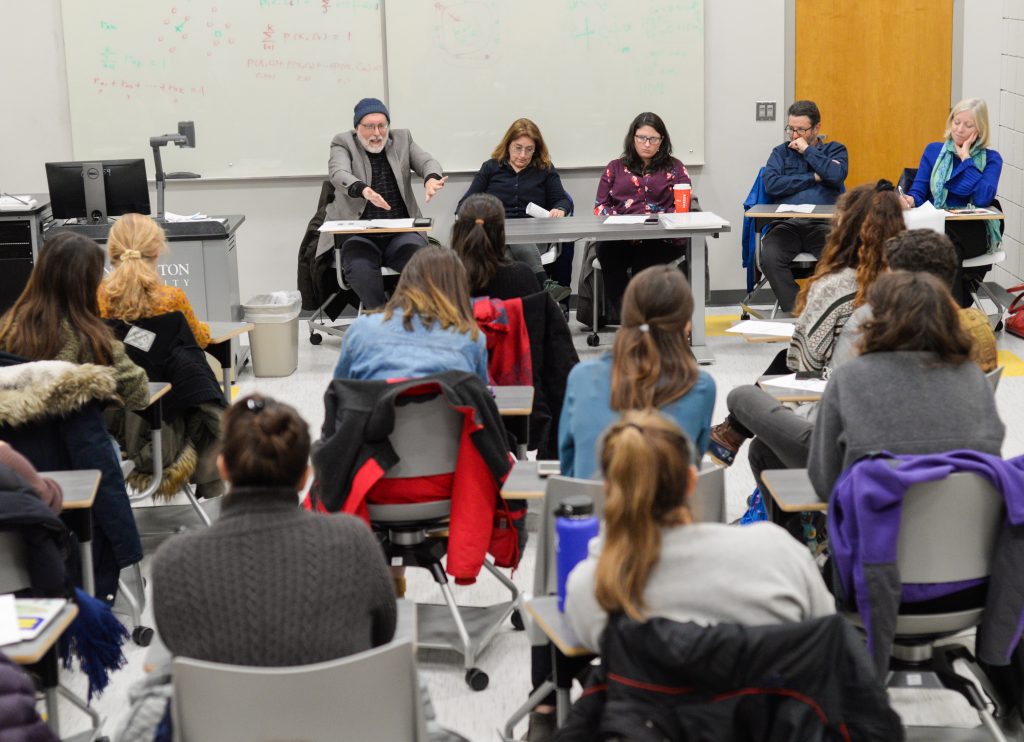
In 2017, Binghamton’s water system served 1,263,688,404 gallons of water to 44,564 people, according to the city’s official website. Now, students are starting discussions on whether this water is as clean as it should be.
A panel of five speakers, each experts of different aspects of local environmentalism, took part in a discussion about Broome County’s water systems on Thursday night. The panel was organized by Binghamton University students who are members of the New York Public Interest Research Group (NYPIRG).
Natalia Romanzo, secretary of the NYPIRG BU chapter and a senior majoring in environmental studies, said the organization’s Environmental Protection Campaign, which she co-chairs, organized the event to educate students and residents on water safety.
“Water quality is an issue prevalent in the Binghamton area, and as a part of NYPIRG, we believe that access to clean drinking water is a right, not a privilege,” Romanzo said. “We’re looking to empower community members to protect their rights and their health.”
Maya Ballabon, outreach coordinator for NYPIRG and a junior majoring in environmental studies, also co-chairs the Environmental Protection Campaign. According to Ballabon, the panel aimed to promote a direct conversation about local water quality and propose possible solutions to the issues in Broome County.
Each speaker presented their perspective on local water quality issues before opening up the discussion to questions.
The first speaker, Laura Pangallozzi, a visiting assistant professor of geography, spoke on the history of water quality protection in the area, which includes the passage of a federal law titled the Clean Water Act in 1972. The law aimed to set higher standards for water quality, but according to Pangallozzi, a lack of federal funding for water treatment plants has hindered its success. In 2016, 55 percent of rivers and streams and 75 percent of lakes and ponds failed to meet standards set by the Clean Water Act.
There are also new threats. William Huston, environmental advocate from NY Friends of Clean Water and Air, said hydraulic fracturing, or fracking, poses significant dangers to water quality. Fracking is a process in which liquid is pumped into rock beds in order to crack them and make room for natural gas to flow through for extraction. It was outlawed across New York in 2014 on the basis that it can cause contamination of groundwater, among other environmental impacts. But fracking is legal in Pennsylvania, which is upstream from the Broome County section of the Susquehanna River.
“Binghamton draws its drinking water directly out of the Susquehanna River, straight out of the river, and then they do some filtering,” Huston said. “There are, back when I checked, about 97 hydrofracked gas wells in Binghamton’s watershed.”
According to Broome County’s website, 70 percent of the county’s water source is from groundwater, or wells, but Binghamton receives its water from the Susquehanna River, a surface water source.
But according to Susan Ryan, a member of the Broome County Legislature for District 11 and a program coordinator of evolutionary studies, there is little that legislators can do to stop the pollution of the Susquehanna River as it flows through other states. Instead, she encouraged students and residents to be informed citizens and vote for politicians that advocate for getting money out of politics. Ryan said passing legislation to prevent corporations and industries from donating to politicians will help ensure laws are passed in favor of environmentalism and local citizens, including laws regulating water quality and banning fracking.
“I think reforming the way money works in politics will then get industry, especially big industry, out of the business of manipulating our democracy,” Ryan said.
Ivo Kennedy, a senior double-majoring in psychology and Spanish, said he attended the panel to learn more about environmental issues in the area. After hearing from speakers, he said he believes the solution to protecting water quality resides in social change.
“There definitely needs to be more activism,” Kennedy said. “Everyone needs to kind of get more involved. One of the speakers was saying it takes a lot of people to make social change like this, and I think it’s super important to do.”
According to Ballabon, the water issue is just one of many environmental concerns that need citizen support to be fully addressed. She said the panel is another way of encouraging students to think deeply about climate change and other large-scale environmental problems.
“Water scarcity and access to clean water is not going to get easier,” Ballabon said. “Especially with all of the climate change issues we have to deal with, it’s only going to exasperate this. So now’s the time to do this.”


